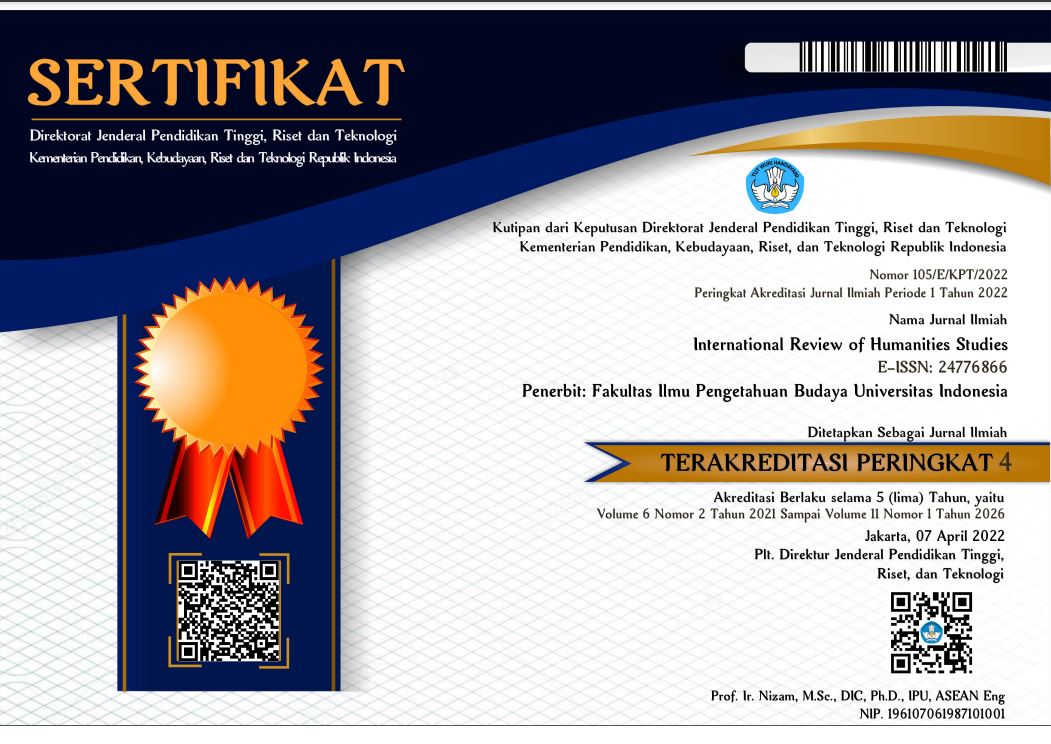International Review of Humanities Studies

Abstract
The concept of multiculturalism has become a keyword of contemporary Korean society. The influx of migrants has made Korea could not escape becoming an ethnically diverse nation and a multicultural society. This study aims to understand the concept of Korean multiculturalism through migrant workers and marriage migrants by examining their life in Korea including what kind of issues the migrants have been encountered and how was the effort of Korean government in tackling those issues. It found that the government occupied an important position in leading multiculturalism in Korea as it was the one who promoted Korea's moving towards multiculturalism particularly by leading migrants coming into Korea. Indeed, the incoming of migrants has diversied Korea's homogenous culture, but migrants seemed to only serve as a "solution" for responding to the demand of cheap labors, the bride's shortage, and care provider deficiency. Multiculturalism supposedly recognizes and accomodates all diversity, yet Korea has not acknowledged and accomodated migrants as minorities in its society.
References
Ahn, J.-H. (2013). Global migration and the racial project in transition: institutionalizing racial difference through the discourse of multiculturalism in South Korea. Journal of Multicultural Discourses, 8(1), 29-47. doi:10.1080/17447143.2012.753894
Bloemraad, I., Korteweg, A., & Yurdakul, G. (2008). Citizenship and immigration: Multiculturalism, assimilation, and challenges to the nation-state.Annu. Rev. Sociol, 34, 153-179.
Choi, Y.-J., & Kyung Hee, U. (2018). Exclusionary Labor and Partially Inclusionary Marriage Immigration Incorporation: The Cases of Japan and Korea. Korea Observer - Institute of Korean Studies, 49(2), 319-348.
doi:10.29152/KOIKS.2018.49.2.319
Choo, H.Y. (2013). The cost of rights: migrant women, feminist advocacy, and gendered morality in South Korea. Gender & Society, 27(4), 445-68.
https://doi.org/10.1177/0891243213483896 \
Denney, S. (2015, September 10). South Korea’s migrant workers in the public eye. The Diplomat. Retrieved from available at http://thediplomat.com/2015/09/south-koreas-migrant-workers-in-the-public-eye/.
Frideres, J. S., & Kim, A. E. (2010). A multicultural landscape and multiculturalism of Canada: Implications for Korea. Korea Observer, 41(4), 677.
Johansson, T. R. (2022). In defence of multiculturalism–theoretical challenges. International Review of Sociology, 1-15.
https://doi.org/10.1080/03906701.2022.2045141
Kang, Soon-Won. (2010). Multicultural education and the rights to education of migrant children in South Korea. Educational Review, 62(3), 287-300. https://doi.org/10.1080/00131911.2010.503599.
Kymlicka, W. (2018). Liberal multiculturalism as a political theory of state–minority relations. Political Theory, 46(1), 81-91.
Lee, B. (2009) The Development of Korea's Immigration Policies: Security, Accumulation, Fairness, and Institutional Legitimacy. Korea Observer 40(4): 763-99.
Lee, H. (2012). Political economy of cross-border marriage: Economic development and social reproduction in Korea. Feminist Economics, 18(2), 177-200.
https://doi.org/10.1080/13545701.2012.688139
Lee, Hye-Kyung. (2008). International marriage and the state in South Korea: focusing on governmental policy. Citizenship Studies, 12(1), 107-23.
https://doi.org/10.1080/13621020701794240.
Lim, Timothy. (2010). Rethinking Belongingness in Korea: Transnational Migration, "Migrant Marriages" and the Politics of Multiculturalism. Pacific Affairs, 83(1), 51-71. https://doi.org/10.5509/201083151.
Mansouri, F., & Modood, T. (2021). The complementarity of multiculturalism and interculturalism: Theory backed by Australian evidence. Ethnic and Racial Studies, 44(16), 1-20.
https://doi.org/10.1080/01419870.2020.171339
Seol, Dong-Hoon. (2010). Which Multiculturalism? Discourse of the Incorporation of Immigrants into Korean Society. Korea Observer, 41(4), 593-614. Retrieved from https://www.researchgate.net/profile/Dong_Hoon_Seol/publication/288173241_Which_multiculturalism_Discourse_of_the_incorporation_of_immigrants_into_Korean_society/links/5c407dcc92851c22a37c302a/Which-multiculturalism-Discourse-of-the-incorporation-of-immigrants-into-Korean-society.pdf.
Seol, D.H. & Han, G.S. (2004). Foreign migrant workers and social discrimination in Korea. Harvard Asia Quarterly, 8(1), 45-50.
The Korea Times. (2023, December 18). Korea's foreign population reaches record-high of 2.26 million. https://www.koreatimes.co.kr/www/nation/2024/01/113_362821.html
Um, Song-gee. (2013). The migration of Asian women for elder care: governing the movement of carers to South Korea. Transnational Social Review, 3(2), 155-72.
https://doi.org/10.1080/21931674.2013.10820762
Watson, Iain. (2010). Multiculturalism in South Korea: A Critical Assessment. Journal of Contemporary Asia, 40(2), 337-46.
https://doi.org/10.1080/00472331003600549
Yang, O. (2019). Political Ideology and Cultural Diversity in South Korea: Toward a Theory of Group-differentiated Rights. international journal on minority and group rights, 26(2), 289-303.
Recommended Citation
Burhan, Ph.D, Amelia
(2024)
"DEBATING MIGRANTS IN KOREAN MULTICULTURALISM,"
International Review of Humanities Studies: Vol. 9:
No.
1, Article 9.
DOI: 10.7454/irhs.v9i1.1276
Available at:
https://scholarhub.ui.ac.id/irhs/vol9/iss1/9
Included in
Anthropology Commons, Art and Design Commons, Creative Writing Commons, Cultural Heritage Law Commons, Education Law Commons, Film and Media Studies Commons, History Commons, Intellectual Property Law Commons, International and Area Studies Commons, Legal Writing and Research Commons, Linguistics Commons, Museum Studies Commons, Philosophy Commons, Urban Studies and Planning Commons


